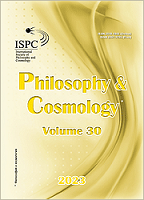The Concept of Zhonghua in Modern Chinese Philosophy and its Cosmological Implications
The Concept of Zhonghua in Modern Chinese Philosophy and its Cosmological Implications
Author(s): Sergii RudenkoSubject(s): Metaphysics, Contemporary Philosophy, Marxism, East Asian Philosophy, Ontology
Published by: Международное философско-космологическое общество
Keywords: The Concept of Zhonghua; Chinese Philosophy; Chinese Cosmology; Chinese Marxism; Cosmos; World;
Summary/Abstract: This article presents the results of a study of both Western and Far Eastern narratives of philosophical cosmology. The task of the study was to analyse the essential characteristics of philosophical cosmology in both Western and Far Eastern paradigms. This was made possible by clarifying the distinction between astronomy and cosmology, on the one hand, and philosophy and philosophical cosmology, on the other. The Greek word “??sµ??” is both etymologically and semantically different from the concept of “space.” If space has only one characteristic, it is an extension, and then the cosmos, being a phenomenon that is not static but dynamic, has internal forces and a movement towards self organisation and harmonisation. A person does not live in space, but in the world; such is the point of view of philosophical cosmology, which means that different cultures may have their own cosmology, which will need to be different. It is in this difference of philosophical cosmologies that the richness of philosophy is seen; by studying other cosmological worldviews, one can better understand one’s own. Scholars, including Weimin Sun, Robert Cummings Neville, and others, agree on the need to intensify interest in Chinese cosmology and its basic concepts. One such concept is Zhonghua. Modern Chinese philosophy is a combination of Marxist philosophy, traditional Chinese philosophy, and Western philosophy. One of the tasks of a modern researcher in China is to find possible points of contact, and common features in order to demonstrate the possible well-functioning cooperation of these currents. In addition, common features are found primarily in cosmology.
Journal: Philosophy and Cosmology
- Issue Year: 30/2023
- Issue No: 30
- Page Range: 116-123
- Page Count: 8
- Language: English

